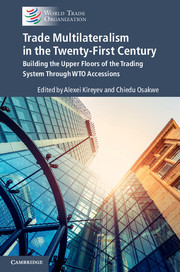 Trade Multilateralism in the Twenty-First Century
Trade Multilateralism in the Twenty-First Century Book contents
- Frontmatter
- Contents
- List of Plates
- List of Figures
- Notes on Contributors
- Foreword
- Acknowledgements
- List of Abbreviations
- Disclaimer
- 1 Making Trade Multilateralism Work for All: The Role of WTO Accessions
- PART I WTO Accessions and the New Trade Multilateralism
- PART II Negotiators’ Perspectives on the WTO Accession Process
- PART III Accessions Acquis: Thematic Perspectives and Implementation Challenges
- 13 How Post-TRIPS Negotiations Reframe the ‘Trade-Related Aspects’ of Intellectual Property after TRIPS: The Lessons of WTO Accessions
- 14 Competition Policy in WTO Accessions: Filling in the Blanks in the International Trading System
- 15 Geographical Indications in the Accessions Landscape
- 16 WTO Accession Commitments on Agriculture: Lessons for WTO Rule-Making
- 17 The WTO-Plus Obligations: Dual Class or a Strengthened System?
- 18 Accession Protocols and the Private Sector
- 19 Post-Accession Support Platform
- 20 Conclusion: Trade Multilateralism - Enhancing Flexibility, Preserving the Momentum
- Contributor Biographies
- Index
- References
13 - How Post-TRIPS Negotiations Reframe the ‘Trade-Related Aspects’ of Intellectual Property after TRIPS: The Lessons of WTO Accessions
from PART III - Accessions Acquis: Thematic Perspectives and Implementation Challenges
Published online by Cambridge University Press: 28 November 2017
- Frontmatter
- Contents
- List of Plates
- List of Figures
- Notes on Contributors
- Foreword
- Acknowledgements
- List of Abbreviations
- Disclaimer
- 1 Making Trade Multilateralism Work for All: The Role of WTO Accessions
- PART I WTO Accessions and the New Trade Multilateralism
- PART II Negotiators’ Perspectives on the WTO Accession Process
- PART III Accessions Acquis: Thematic Perspectives and Implementation Challenges
- 13 How Post-TRIPS Negotiations Reframe the ‘Trade-Related Aspects’ of Intellectual Property after TRIPS: The Lessons of WTO Accessions
- 14 Competition Policy in WTO Accessions: Filling in the Blanks in the International Trading System
- 15 Geographical Indications in the Accessions Landscape
- 16 WTO Accession Commitments on Agriculture: Lessons for WTO Rule-Making
- 17 The WTO-Plus Obligations: Dual Class or a Strengthened System?
- 18 Accession Protocols and the Private Sector
- 19 Post-Accession Support Platform
- 20 Conclusion: Trade Multilateralism - Enhancing Flexibility, Preserving the Momentum
- Contributor Biographies
- Index
- References
Summary
Abstract
The WTO Agreement on Trade-Related Aspects of Intellectual Property Rights (TRIPS) established the first multilateral understanding of what constitutes a standard for ‘adequate’ and ‘effective’ protection of intellectual property rights, and established a new mechanism for monitoring and reviewing how these standards are met. The policy and legal framework defined by the TRIPS Agreement has, in the two decades since it entered into force, progressively gained acceptance as a legitimate, balanced and transparent set of standards. Since then, however, two parallel sets of negotiations have revisited the standards defined by TRIPS: the multilateral WTO accession negotiations, and bilateral and regional trade negotiations outside the WTO. In each case, TRIPS standards have been further elaborated, and timelines for their implementation altered, in a manner that produces a layering of rules upon the foundation of TRIPS. However, the institutional, legal and policy implications of these two lines of development contrast sharply. This chapter reviews the main lines of development of rules relating to intellectual property in the accession processes, and contrasts these with the parallel developments outside the WTO. It concludes with an analysis of the policy and practical lessons that can be derived from contrasting these two processes.
Introduction
The entry into force of the WTO Agreement on Trade-Related Aspects of Intellectual Property Rights (TRIPS), along with the inception of the WTO in 1995, was a turning point for multilateral governance and a catalyst for a transformation of law, policy and international relations in intellectual property (IP) and a host of related policy fields. Through the linking concept of ‘trade-related aspects’ of IP rights, the TRIPS negotiations forged a transformation both in the international governance of IP and in the very conception of trade within multilateral trade law and policy. The notion of a ‘paradigm shift’ seems apt, since TRIPS:
• decisively reframed IP as a positive subject of international trade law, acknowledging that expectations on ‘adequate and effective’ protection of IP form a legitimate subject for international trade negotiations – as an agreement on trade-related aspects of IP, TRIPS was essentially an agreement that IP is trade-related, and through its general principles and standards on the recognition of specific IP rights under domestic law, and the administration and enforcement of these rights, defined an agreed multilateral standard on what amounts to such ‘adequate and effective’ protection;
- Type
- Chapter
- Information
- Trade Multilateralism in the Twenty-First CenturyBuilding the Upper Floors of the Trading System through WTO Accessions, pp. 269 - 298Publisher: Cambridge University PressPrint publication year: 2017


